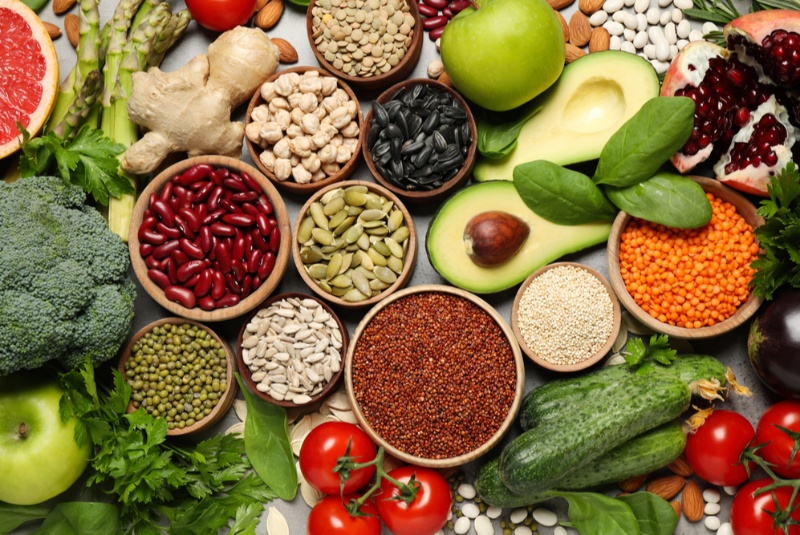Heart health is a priority for people of all ages, as cardiovascular diseases remain a leading cause of mortality worldwide. Maintaining a heart-healthy diet is one of the most effective ways to prevent heart-related issues, as the foods you eat directly impact blood pressure, cholesterol levels, and overall cardiovascular function. By incorporating doctor-recommended foods into your daily routine, you can significantly improve heart health while reducing risks associated with poor diet choices.

Foods to Eat for a Healthier Heart
Doctors and dietitians agree that certain foods can have a protective effect on the heart. These nutrient-rich options support healthy blood flow, lower cholesterol, and stabilize blood pressure.
- Leafy Green Vegetables: Spinach, kale, and Swiss chard are rich in antioxidants, vitamins, and minerals. They contain nitrates that help dilate blood vessels and reduce blood pressure. Learn more about leafy greens and other heart-healthy foods here.
- Berries: Berries like strawberries, blueberries, and raspberries are packed with antioxidants, which reduce inflammation and oxidative stress, key contributors to heart disease.
- Whole Grains: Oats, brown rice, barley, and quinoa provide fiber that helps lower LDL cholesterol. Fiber also improves digestion, stabilizing blood sugar levels and reducing heart disease risks.
- Avocados: This heart-friendly fruit is high in monounsaturated fats, which are beneficial for reducing bad cholesterol. Avocados also provide potassium, which supports blood pressure management.
- Fatty Fish: Salmon, mackerel, and sardines are rich in omega-3 fatty acids, which have been shown to lower triglyceride levels and prevent artery blockages. For other ways to include omega-3s in your diet, consider tips from University of Iowa Health Care’s list of heart-healthy foods.
Including these foods in your diet can provide essential nutrients that directly benefit heart health.
Foods to Avoid for a Healthier Heart
Just as some foods protect the heart, others can negatively impact cardiovascular health, leading to issues like hypertension, high cholesterol, and plaque buildup. Limiting the following can help maintain a healthier heart.
- Processed Meats: Bacon, sausages, and deli meats are high in sodium and unhealthy fats. These ingredients contribute to higher blood pressure and cholesterol levels, both risk factors for heart disease.
- Refined Carbohydrates and Sugary Foods: Foods made with white flour, such as pastries, bread, and sweets, lack fiber and essential nutrients. High sugar content also leads to weight gain and elevated blood sugar levels.
- Fried Foods: Fried foods like French fries, fried chicken, and donuts are loaded with trans fats, which increase bad cholesterol and contribute to arterial plaque buildup.
- Soda and Sugary Beverages: Sugary drinks are a major source of added sugars, contributing to obesity and insulin resistance, both of which can lead to heart disease.
- Excess Salt: Sodium-rich foods, especially processed snacks and canned soups, can raise blood pressure. High blood pressure forces the heart to work harder, increasing the risk of heart attack and stroke.
To protect your heart, make it a priority to reduce these foods in your diet. For more details on foods to avoid and those that benefit heart health, refer to Harvard Health’s guide on heart-healthy eating.
Essential Nutrients for Heart Health
Eating a balanced diet that emphasizes certain nutrients can significantly benefit heart function. Here are some key nutrients to include:
- Fiber: Fiber helps reduce cholesterol and promotes satiety, preventing overeating. Foods high in fiber include oats, beans, fruits, and vegetables.
- Omega-3 Fatty Acids: Known for their anti-inflammatory properties, omega-3s improve artery health and lower triglycerides. Fish like salmon and flaxseeds are great sources.
- Antioxidants: Berries, nuts, and dark chocolate contain antioxidants, which protect cells from damage by free radicals and reduce inflammation.
- Magnesium: Magnesium helps regulate blood pressure. Foods high in magnesium include leafy greens, nuts, seeds, and whole grains.
Incorporating these nutrients into your diet supports heart health in a natural way, reducing the need for medical interventions. UC Davis Health’s blog by a cardiovascular dietitian also offers practical insights into nutrient-rich heart foods.
Easy Heart-Healthy Meal Ideas
Creating heart-friendly meals doesn’t have to be complicated. Here are some ideas that combine the best heart-healthy foods into delicious dishes:
- Oatmeal with Berries and Nuts: Start your day with a bowl of fiber-rich oats topped with antioxidant-packed berries and heart-healthy nuts like almonds or walnuts.
- Salmon Salad with Avocado: Combine grilled salmon with leafy greens, cherry tomatoes, cucumbers, and avocado. Add a squeeze of lemon and a sprinkle of olive oil for added heart benefits.
- Whole Grain Wrap with Vegetables and Hummus: Choose a whole-grain wrap, fill it with leafy greens, bell peppers, carrots, and a dollop of hummus for a flavorful and fiber-rich lunch.
- Quinoa and Black Bean Bowl: Mix cooked quinoa with black beans, diced tomatoes, corn, and avocado for a protein-packed, nutrient-dense dinner option.
Simple meal ideas like these ensure you get the nutrients essential for heart health without sacrificing flavor or convenience.
Tips for Incorporating Heart-Healthy Foods into Your Diet
Incorporating new foods into your daily meals can be challenging. Here are some practical tips to make it easier:
- Make Small Changes Gradually: Start by adding one or two new heart-healthy foods each week.
- Prepare Meals Ahead: Cook larger portions of grains, lean proteins, and vegetables to have ready-made options throughout the week.
- Read Labels Carefully: When buying packaged foods, check labels for hidden sugars, sodium, and unhealthy fats that can affect heart health.
- Limit Fast Food and Takeout: Opt for home-cooked meals, where you have control over the ingredients.
Making these small adjustments can lead to significant improvements in heart health over time. For additional strategies, check out WebMD’s recommended foods to save your heart.
Benefits of a Heart-Healthy Diet
A heart-healthy diet goes beyond preventing heart disease. It provides numerous health benefits, such as:
- Improved Energy Levels: Nutritious foods boost energy by providing stable blood sugar and sustained fuel for the body.
- Enhanced Mental Health: Many heart-healthy foods, like fatty fish and leafy greens, contain nutrients that support cognitive function and mental well-being.
- Reduced Inflammation: Whole foods rich in antioxidants and omega-3 fatty acids help reduce inflammation, which benefits overall health.
- Weight Management: High-fiber foods promote satiety, making it easier to maintain a healthy weight.
By adopting heart-healthy eating habits, you can experience lasting benefits that improve both your physical and mental health.




